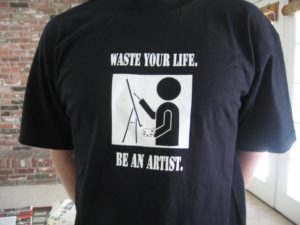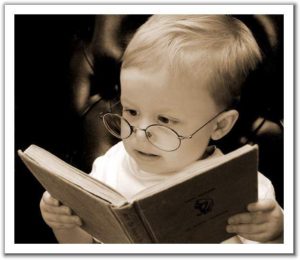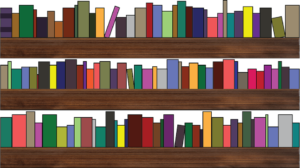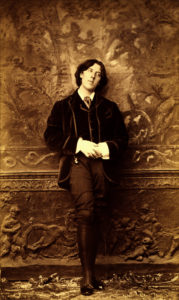Welcome back, class.
Today’s lecture might be profoundly interesting or dangerously boring; it depends on the level of pleasure you take in defining things. I know that some of you couldn’t care less. I can see it in your eyes.
But for those of you staring unblinkingly, waiting with bated breath…have I got a treat for you! You’re what the “academics” call “academics.” Understanding theory and theoretical ideas actually interests you, and bonus points are in order if you like learning things that have no practical value in the working world whatsoever. You’re my kind of people.
 A lot of my time in literature courses at college was spent asking the probing question, “What is literature?” (We’ll get to WHY that’s an important question in a bit.) It seems like a simple enough question, but it always invokes a huge discussion that usually boils down to this: literature is art that uses words and language. It’s also described as a category of art—literature is always art but art is not always literature.
A lot of my time in literature courses at college was spent asking the probing question, “What is literature?” (We’ll get to WHY that’s an important question in a bit.) It seems like a simple enough question, but it always invokes a huge discussion that usually boils down to this: literature is art that uses words and language. It’s also described as a category of art—literature is always art but art is not always literature.
Some define it by examples: obvious ones like novels, plays, and poems, as well as more obscure examples like movies, blog posts (!), and essays. Even the most clinical or scientific documents can be told artfully, and can therefore be considered literature. I know of a woman who wrote her dissertation claiming that kitchen recipes were a form of literature.

A T-Shirt Poem
This leads me to one of my favorite claims: ANYTHING that uses words or text is literature. A letter, an e-mail, a paycheck, a coffee mug, a T-shirt, a company logo, a video game, a poster, a political speech, a prescription label…all of it, literature! So next time you have a surprise essay to write, and you’re stumped, argue that your T-shirt is a poem (at your own peril).
However, it’s worth mentioning that we don’t read tax reports like we read Shakespeare. We don’t read stop signs like we read poetry, and we don’t read magic 8 balls like we read Harry Potter. Something in our collective social standards distinguishes between high art and instruction manuals. Some metaphorical blurry line exists out there between literature and other word-piles.
Or…maybe it’s all relative. Literature is literature because someone somewhere says that it’s literature, and you can’t declare it non-literature because they have just as much a God-given right to name something literature as you do. Literature is in the eye of the beholder.
 But let’s bring it back down to something resembling sanity. Why do we read? Usually, to learn something. When we read Shakespeare, we want to learn about the characters he’s created and the philosophy he’s trying to sell. When we read a letter or e-mail, it’s to keep up correspondence and to understand their goal or message in sending their note. When we read a magic 8 ball, we want a prediction, whether we believe it or not.
But let’s bring it back down to something resembling sanity. Why do we read? Usually, to learn something. When we read Shakespeare, we want to learn about the characters he’s created and the philosophy he’s trying to sell. When we read a letter or e-mail, it’s to keep up correspondence and to understand their goal or message in sending their note. When we read a magic 8 ball, we want a prediction, whether we believe it or not.
We read for the same reason we act at all—we want something. We break the law of inertia and move against the stillness of the world because we, as human beings, have desires. Maybe if a piece of art or text gives us something we desire, it “counts” as literature.
At this point, it might be easier to discuss literary characteristics than to try defining it head-on. We can consider the books I’ve read for this class literature: Alice’s Adventures in Wonderland, the Harry Potter series, The Lord of the Rings, The Picture of Dorian Gray, and currently, 1984. Everything you learned in High School English is there—characters, plot, themes, setting, dialogue, and various other indications of literature. Each one gives us something to take away and use…some kind of message or lasting idea, whether we want it or not. Does that make each of these novels literature? If a painting or sculpture can accomplish the same feat, is it literature as well?
 I’ve tortured you enough. There is no definite answer to this question, and asking it is more academic “fun” than it is accomplishing ANYTHING. And yet, my follow-up question still stands: why is a question like this important? Don’t worry, it’s a much easier question to answer.
I’ve tortured you enough. There is no definite answer to this question, and asking it is more academic “fun” than it is accomplishing ANYTHING. And yet, my follow-up question still stands: why is a question like this important? Don’t worry, it’s a much easier question to answer.
Defining literature is a lot like defining art or music. As soon as you start drawing lines in the sand between music and not-music, anyone can come along and claim otherwise. Example: random drum banging, screeching guitars, and uncensored swearing is as much music as Beethoven. Music and literature are art, and though their actual definitions are reliable, they are subject to change.

Oscar Wilde
I’ve quoted Oscar Wilde in an earlier post, from his preface to The Picture of Dorian Gray; he claims that the only purpose for something useless is that it is admired, and that “All art is quite useless.” This isn’t bad PR for artists; it’s Wilde’s way of saying that art is supposed to affect the soul, and it has no other practical purpose.
So asking ourselves how to define something like literature is our way of defining what serves our soul, and that’s worth keeping an eye out for. Traditionally, the kind of literature that affects us most is poetry, but we’ve been open to suggestions for the past couple thousand years. The once low art form of film has risen to new heights in the realm of literature, and in a hundred years, stop signs and tax reports may surprise us.
Your homework: fight me. Take something above that you disagree with and challenge my views. Don’t be afraid to comment: you’re a human being with opinions, and it gets lonely around here otherwise. How might you define literature differently? What’s something you consider literature that most others don’t?
(No one turned in homework for last week. I’m very disappointed, students. I know professors who kick out their entire classes when such mutiny occurs. You are very fortunate to have a caring and merciful teacher like me. In any case, the option for commenting is still open, for this post and the previous one.)
I’m continuing 1984, so expect a rousing political lecture next Wednesday! Have a good week!
Prof. Jeffrey
This comment is from a friend of mine (it’s not me, I didn’t write it, I swear). Thanks Kye!
The definition of art (as found on google) is this: “the expression or application of human creative skill and imagination, typically in a visual form such as painting or sculpture, producing works to be appreciated primarily for their beauty or emotional power.”
While art can be inspired by ordinary objects, thoughts, and observations, art cannot itself be mundane. According to the definition, it is an expression of creativity. Therefore art needs to purposely be art. This means that a stop sign, for instance, cannot be art—it is not an expression of creativity, it is a physical manifestation of the law, a metal-plated command. A stop sign can inspire a poem, or a painting, or some other form of creativity—for instance, someone could look at a stop sign and spray-paint something on it in order to express creativity or make a creative observation, then that stop sign can be art, but only because of the addition.
You said that all literature is art, but not all art is literature. If we’re going by the actual definition of art, then we are forced to believe that not all writing can be literature. Sending a text to a cousin at the airport saying “hey I’m here” can’t be literature, because there is nothing creative about that text. The text serves one specific purpose, which is to let the cousin know that the sender is at the airport to pick them up. It is strictly social protocol, devoid of creative expression, and is not going to be appreciated for its “beauty or emotional power,” it will be appreciated because the cousin doesn’t have to wonder whether the person is there to get them or not.
However, art is subjective. Anne Frank’s diary wasn’t necessarily originally intended to be art (unless there’s something I don’t know), and now there is a play based on it, and most people have studied it in English classes. Not everyone has enjoyed it, or appreciated the emotional power it holds due to the historical background behind it, but that doesn’t instantly render it mundane and not literature or art. On that same vein, that “hey I’m here” text could be meaningful with background. Maybe the sender and the cousin hadn’t talked in years and the cousin would have been screwed if the sender hadn’t come to pick them up since they don’t know anyone else in the area. In this case, the “hey I’m here” could hold emotional power in the gesture it holds. In that case, the art would be in the subtext.
And maybe that’s the important part, the subtext. It’s hard to cause a reaction in someone based on something they have no connection to or knowledge about. For instance, for the cousin that text would have a lot of meaning and power, but for a stranger glancing at the cousin’s phone as the text comes in, it could mean nothing. And to another person who maybe saw it, it could affect them deeply because they have no one there to pick them up, or maybe because they’re so incredibly excited to see the person who is picking them up after all the time it had been since they saw each other. But without subtext, without the backstory that humans innately need to be affected by anything at all (like those “feed the hungry” commercials that try to make the stories personal to each specific child rather than a general “these kids need food” in order to tug at people’s heart strings and make them want to give money), art seems much more objective. With it, however, literally anything can be art.
As you said, “Literature is in the eye of the beholder.”
Let me paint you a picture:
It’s a post-apocalyptic future. All governments and laws are abolished. Anarchy rules the Earth. A lonely artist, reminiscing on the bygone times of the safety and security of government, finds a photograph of a traffic intersection from the old world. A tear comes to his eye. He sees the stop sign.
He wants to recapture that moment…he wants some kind of symbolic order. He wants the chaos around him to STOP. He gathers his materials and painstakingly, masterfully recreates the stop sign in the photograph. He displays it for all to see as a message, as his artist-voice. It’s the new literature.
I don’t actually disagree with anything you said, but I wanted to elaborate on why a stop sign might be literature in a hundred years. I’m mostly just glad I’m quotable!
My personal philosophy is that literature is any kind of writing. I was arguing both sides in the original post, but I don’t think all literature is art…especially if we’re using Oscar Wilde’s definition. I think all writing has bias and comes from sources (human beings) that are flawed, and all writing can therefore be pulled apart like any piece of literature studied in a classroom. If we distance ourselves enough from any slice of culture, it becomes strange and worth pulling apart, and that’s one of the facets of literature—it’s always something worth studying. Shakespeare wasn’t always considered literature (much less “good” literature), but his works are now worth studying as texts. In the future, when we’ve distanced ourselves from the use of stop signs (or blog posts, or text messages, or diaries), those facets of culture, suddenly obsolete, are worth studying. Texts that aren’t literature become literature simply because they are texts. So I believe in pressing fast-forward—any text “counts” as literature in my book.
This just in:
http://mobile.nytimes.com/2016/10/14/arts/music/bob-dylan-nobel-prize-literature.html?_r=0&referer=http://m.facebook.com/